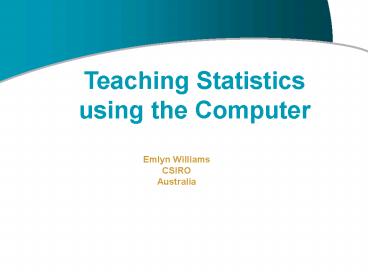Divisional Presentation Template - PowerPoint PPT Presentation
1 / 27
Title:
Divisional Presentation Template
Description:
Quincunx experiment. Simulates a process to produce tubing with 50mm diameter ... Quincunx board. One sequence of 25 balls. mean=49.6. sd=1.5. Tampering ... – PowerPoint PPT presentation
Number of Views:80
Avg rating:3.0/5.0
Title: Divisional Presentation Template
1
Teaching Statistics using the Computer
Replace this box with a picture? Just click
Insert Picture from file Locate your
image Click insert Position picture over box
Crop/scale etc. Select picture, hold down shift
key and click on white background then Click Draw
rder send to back The top of your picture
should be hidden by the top shape.
Emlyn Williams CSIRO Australia
2
Statistics students in Australia
- Decline in statistics student numbers in
Australia - During 2003, 3000 PhDs in Australia
- Only 186 PhDs in Mathematical and Statistical
Sciences - Why?
3
Possible reasons for the decline
- Popularity of Computing Science
- Reduced capacity of our Universities to train
Maths / Stats professionals - Type of Statistics being taught in Secondary
Schools - Distribution theory
- Probability
- Equations / formulas
4
Some possible directions
- Data mining
- Microarrays
- Normalization
- Multivariate
- Significance testing
- Model selection
- Resampling
- Permutation tests
- Computer-based techniques
5
Understanding variation
- ..the central problem in management and
leadership is failure to understand the
information in variation Dr W. Edwards Deming - Concept can be grasped without emphasizing
mathematics or formulas - Hands-on experiments
- Book Statistical Thinking for Managers by J.A.
John, D. Whitaker and D.G. Johnson
6
Classroom experiments
- Beads experiment
- Many white and red beads majority white
- Samples of 50 taken
- Plot the number of red beads over time
- Quincunx experiment
- Simulates a process to produce tubing with 50mm
diameter - The process involves several steps
- An operator is employed to monitor the process
7
Quincunx board
8
One sequence of 25 balls
mean49.6 sd1.5
9
Tampering
- Method 2 Process adjustment. The operator
tries to compensate for the results of the
previous sample - Method 3 Variability reduction. The operator
adjusts to try and achieve the same result as the
previous sample
10
Means of 50 balls for 30 sequencesMethods 1 and
3 (Method 250.0)
11
Standard deviations of 50 balls for 30
sequences Methods 1,2 and 3
12
Analysis of Designed Experiments
Replicate Seedlot Tree
4 X X X X X X X X
3 X X X X X X X X
1 5 X X X X X X X X
2 X X X X X X X X
1 X X X X X X X X
4 X X X X X X X X
1 X X X X X X X X
2 3 X X X X X X X X
5 X X X X X X X X
2 X X X X X X X X
Seedlots 1 Acacia
2 Angophora 3
Casuarina 4 Melaleuca
5 Petalostigma
13
Analysis of Variance Table
Source of variation d.f. s.s.
m.s. v.r. F pr. repl
1 20.301 20.301 7.54 seedlot
4 505.868 126.467 49.94 lt.001
Residual 74 199.350
2.694 Total 79 725.529
Tables of means Grand mean 6.12
seedlot Acacia Angophora Casuarina
Melaleuca Petalostigma 10.29
7.10 5.51 4.94 2.73
14
Correct Analysis of Variance Table
Source of variation d.f. s.s.
m.s. v.r. F pr. repl stratum
1 20.301 20.301 3.42 repl.plot
stratum seedlot 4 505.868
126.467 21.30 0.006 Residual
4 23.746 5.936 2.37 repl.plot.tree
stratum 70 175.614 2.509 Total
79 725.529 Tables of
means Grand mean 6.12 seedlot Acacia
Angophora Casuarina Melaleuca Petalostigma
10.29 7.10 5.51 4.94
2.73
15
- Treatment
- Technical Replicate
- Dye
- Array
16
- Treatment
- Biological Replicate
- Technical Replicate
- Dye
- Array
17
Opening screen of DataPlus
18
Step-by-step instruction
- Choose you experiment design from the list
- Click the Next button
19
Step-by-step instruction
- Type in the numbers of replicates, plots and
trees - Click the Next button
20
Treatment screen
Treatment Levels to Input treatment names
Treatment Layout to Input the treatment layout
Note plots stratum
21
Measurement screen
22
Output Summary screen
23
Design of Experiments
- Designs mainly used to be constructed using
combinatorics or group theory - The class of Partially Balanced Incomplete Block
designs was defined and developed - These designs did not always focus on quantities
of importance to practitioners - We need to maximize the amount of treatment
information in the lowest stratum (where we have
most precision) - The average efficiency factor does this and can
be used as an objective function in a computer
search algorithm
24
Two possible arrangements for an incomplete
block design with 9 treatments
Replicate 1 Replicate
2 Block 1 2 3 1 2
3 ____________
___________ 1 4 7
1 2 3 2 5 8
4 5 6 3 6 9 7
8 9 Replicate 1
Replicate 2 Block 1 2 3
1 2 3 ___________
___________ 1 4 7
1 5 4 2 5 8 2
8 6 3 6 9 3
9 7
25
Software - CycDesigN
- Windows 95 to XP
- Visual C
- Resolvable / non-resolvable
- Block / row-column
- One / two stage
- Cyclic / alpha / other
- Factorial / nested treatments
- t-Latinized / partially-latinized
- Unequal block sizes
26
Latinized row-column design for 20 treatments
27
Summary
- In Australia (and probably elsewhere) we need to
change some of the teaching practice and content
in secondary schools and universities in order to
prevent a continuing decline in the number of
statistics students - Development of and education using computer-based
statistical techniques may provide an attractive
addition to existing curricula































